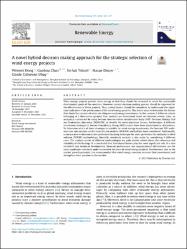| dc.contributor.author | Dong, Weiwei | |
| dc.contributor.author | Zhao, Guohua | |
| dc.contributor.author | Yüksel, Serhat | |
| dc.contributor.author | Dinçer, Hasan | |
| dc.contributor.author | Ubay, Gözde Gülseven | |
| dc.date.accessioned | 2022-01-07T06:33:40Z | |
| dc.date.available | 2022-01-07T06:33:40Z | |
| dc.date.issued | 2022 | en_US |
| dc.identifier.citation | Dong, W., Zhao, G., Yüksel, S., Dinçer, H. ve Ubay G. G. (2022). A novel hybrid decision making approach for the strategic selection of wind energy projects. Renewable Energy, 185, 321-337. https://doi.org/10.1016/j.renene.2021.12.077 | en_US |
| dc.identifier.issn | 0960-1481 | |
| dc.identifier.uri | https://doi.org/10.1016/j.renene.2021.12.077 | |
| dc.identifier.uri | https://hdl.handle.net/20.500.12511/8780 | |
| dc.description.abstract | Wind energy projects provide clean energy so that they should be increased to reach the sustainable development goals of the countries. However, current decision-making process should be improved for the effectiveness of these projects. Thus, critical factors should be considered to understand the significant indicators of the performance of the wind energy projects. This article aims to determine the factors that should be considered when deciding on wind energy investments. In this context, 9 different criteria belonging to 3 dimensions (project, firm, market) are determined based on literature review. Later, an analysis is carried out by using hesitant interval-valued intuitionistic fuzzy (IVIF) Decision Making Trial and Evaluation Laboratory (DEMATEL) to identify the most important factors. Furthermore, 4 different investment strategies in Boston Consultancy Group (BCG) matrix have been determined as alternatives. To determine which of these strategies is suitable for wind energy investments, the hesitant IVIF multi-objective optimization on the basis of ratio analysis (MOORA) method has been considered. Additionally, a comparative evaluation is also performed by using technique for order preference by similarity to ideal solution (TOPSIS) methodology. Similarly, sensitivity analysis is also made by considering 9 different cases. The analysis results of different methodologies are quite similar which shows the coherency and reliability of the findings. It is concluded that firm-based factors play the most significant role. It is also identified that technical development, financial performance and organizational effectiveness are the most significant criteria to make investment decision on wind energy projects. Furthermore, due to the market growth potential, it is recommended that wind energy investors increase their investments and strengthen their position in the market. | en_US |
| dc.language.iso | eng | en_US |
| dc.publisher | Elsevier | en_US |
| dc.rights | info:eu-repo/semantics/embargoedAccess | en_US |
| dc.subject | BCG Matrix | en_US |
| dc.subject | Hesitant IVIF DEMATEL | en_US |
| dc.subject | Hesitant IVIF MOORA | en_US |
| dc.subject | Wind Energy Investment | en_US |
| dc.title | A novel hybrid decision making approach for the strategic selection of wind energy projects | en_US |
| dc.type | article | en_US |
| dc.relation.ispartof | Renewable Energy | en_US |
| dc.department | İstanbul Medipol Üniversitesi, İşletme ve Yönetim Bilimleri Fakültesi, Uluslararası Ticaret ve Finansman Bölümü | en_US |
| dc.authorid | 0000-0002-9858-1266 | en_US |
| dc.authorid | 0000-0002-8072-031X | en_US |
| dc.authorid | 0000-0002-6709-6495 | en_US |
| dc.identifier.volume | 185 | en_US |
| dc.identifier.startpage | 321 | en_US |
| dc.identifier.endpage | 337 | en_US |
| dc.relation.publicationcategory | Makale - Uluslararası Hakemli Dergi - Kurum Öğretim Elemanı | en_US |
| dc.identifier.doi | 10.1016/j.renene.2021.12.077 | en_US |
| dc.identifier.wosquality | Q1 | en_US |
| dc.identifier.wos | 000778545900013 | en_US |
| dc.identifier.scopus | 2-s2.0-85121747491 | en_US |
| dc.identifier.scopusquality | Q1 | en_US |


















